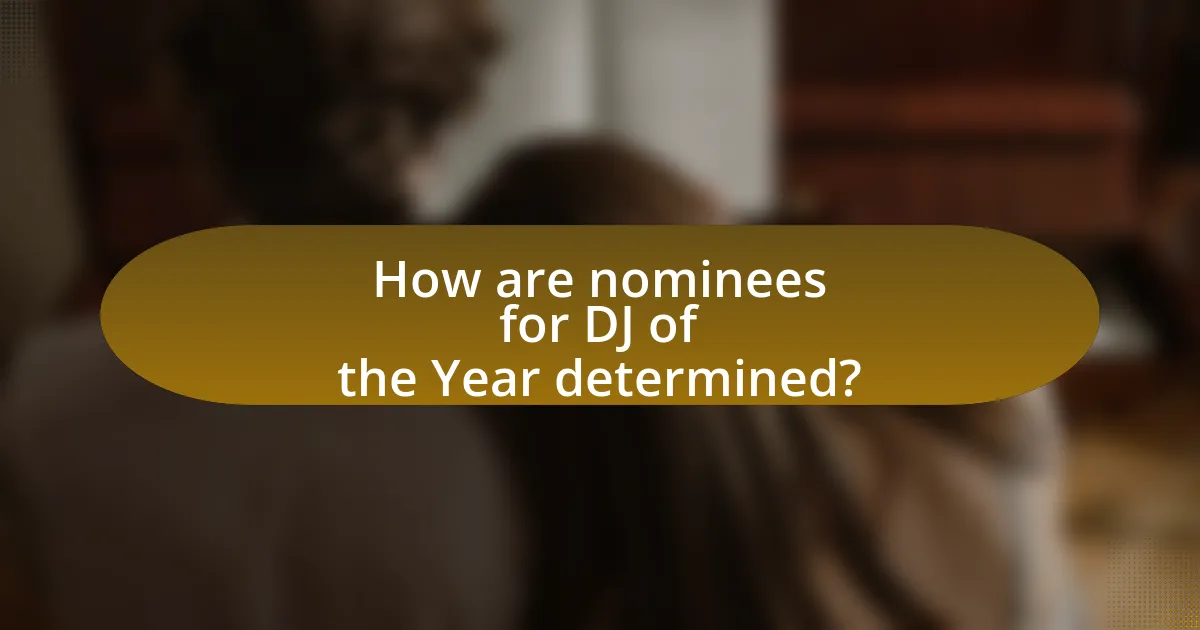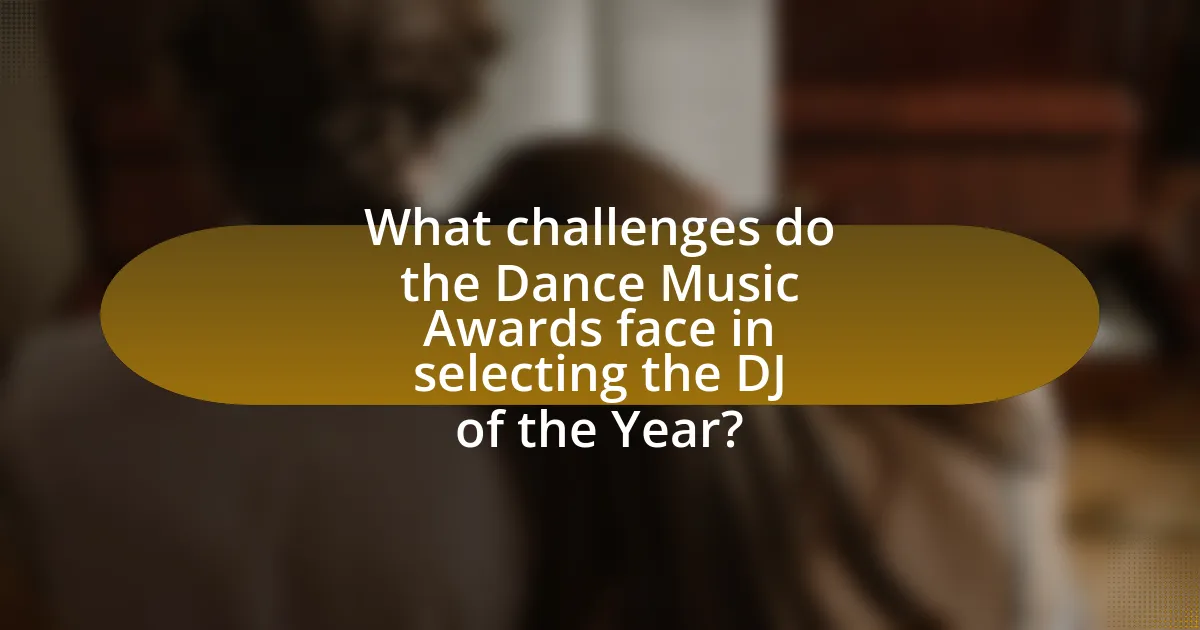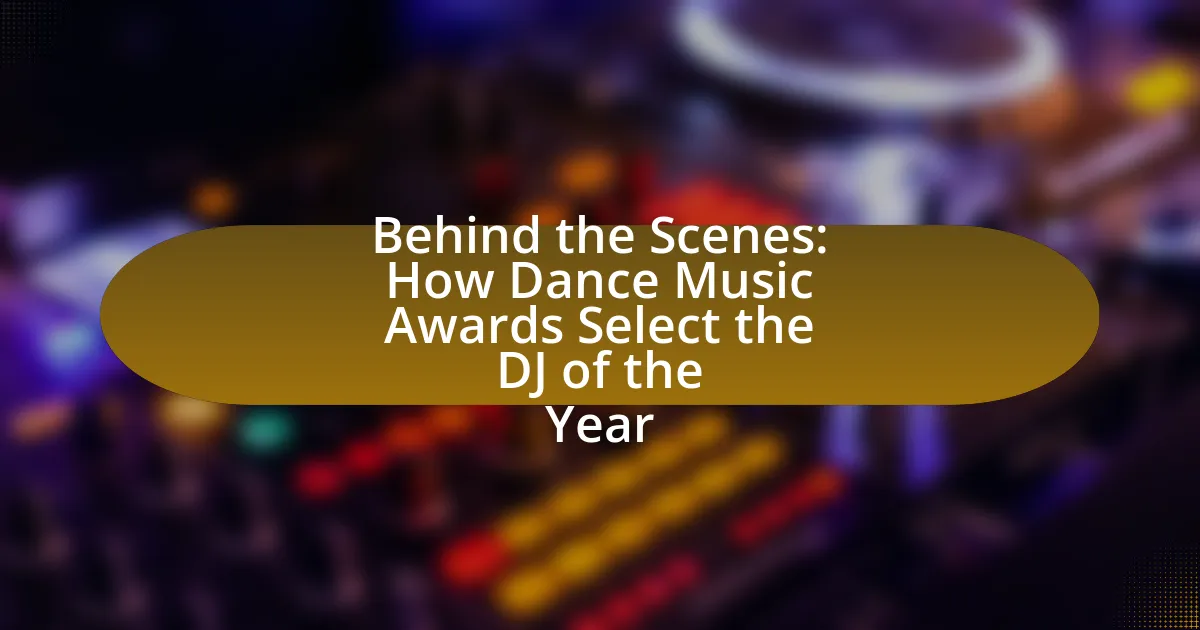The Dance Music Awards are prestigious accolades that recognize excellence in the electronic dance music (EDM) industry, significantly impacting artists’ careers and shaping industry trends. This article explores the selection process for the DJ of the Year, detailing the criteria for nominations, the voting structure involving public and industry expert input, and the challenges faced in ensuring fairness and transparency. It also discusses the influence of social media and fan engagement on nominations, the innovations being introduced in the selection process, and strategies for aspiring DJs to enhance their chances of recognition.

What are the Dance Music Awards and their significance?
The Dance Music Awards are prestigious accolades that recognize and celebrate excellence in the electronic dance music (EDM) industry. Their significance lies in their ability to highlight outstanding artists, producers, and DJs, thereby influencing trends and shaping the future of dance music. Established to honor creativity and innovation, these awards serve as a benchmark for success within the EDM community, fostering competition and inspiring artists to elevate their craft. The awards also provide fans with a platform to engage with their favorite artists, enhancing the overall experience of the dance music culture.
How do the Dance Music Awards impact the DJ community?
The Dance Music Awards significantly impact the DJ community by providing recognition and validation to artists, which can enhance their careers. Winning or being nominated for an award elevates a DJ’s status, leading to increased bookings, higher fees, and greater visibility in the industry. For instance, past winners have reported a substantial rise in their audience reach and opportunities following their recognition, demonstrating the awards’ influence on professional growth and marketability within the competitive landscape of dance music.
What recognition do winners receive from the Dance Music Awards?
Winners of the Dance Music Awards receive a prestigious trophy as recognition for their achievements. This trophy symbolizes excellence in the dance music industry and is awarded based on votes from fans and industry professionals. The recognition not only enhances the winner’s reputation but also serves as a benchmark for success within the competitive landscape of dance music.
How do the awards influence DJ careers and the music industry?
Awards significantly influence DJ careers and the music industry by enhancing visibility, credibility, and opportunities for artists. Winning or being nominated for prestigious awards can lead to increased media exposure, attracting larger audiences and bookings. For instance, the DJ Mag Top 100 DJs poll has historically propelled DJs like Armin van Buuren and Tiësto to international fame, resulting in lucrative contracts and festival headlining slots. Additionally, awards can shape industry trends by highlighting emerging genres and talents, thus impacting the overall direction of the music scene. This dynamic illustrates how recognition through awards not only elevates individual careers but also influences the broader music landscape.
What criteria are used to select the DJ of the Year?
The criteria used to select the DJ of the Year typically include factors such as popularity, performance quality, innovation, and influence within the electronic music scene. Popularity is often measured through metrics like ticket sales, streaming numbers, and social media presence. Performance quality assesses the technical skills and creativity displayed during live sets. Innovation refers to the DJ’s ability to introduce new sounds or techniques, while influence evaluates their impact on other artists and the genre as a whole. These criteria are commonly utilized by award organizations to ensure a comprehensive evaluation of a DJ’s contributions over the year.
How is the voting process structured for the DJ of the Year?
The voting process for the DJ of the Year is structured through a combination of public voting and industry panel evaluations. Initially, fans can cast their votes online, contributing to a significant portion of the final tally. This public input is then supplemented by votes from a panel of industry experts, which ensures that both fan engagement and professional insights are considered. The final results are typically announced during a designated awards ceremony, reflecting the collaborative nature of the voting process.
What role do public votes play in the selection process?
Public votes serve as a significant factor in the selection process for the DJ of the Year at Dance Music Awards. They allow fans to directly influence the outcome by expressing their preferences, which reflects the popularity and support for specific DJs within the community. This democratic approach not only engages the audience but also ensures that the final decision resonates with the broader fan base, making the awards more representative of public opinion. Historical data from previous awards shows that public votes have consistently impacted the rankings, demonstrating their importance in shaping the final results.

How are nominees for DJ of the Year determined?
Nominees for DJ of the Year are determined through a combination of public voting, industry expert panels, and performance metrics. The process typically involves gathering data on DJs’ popularity, including their social media presence, streaming statistics, and live performance attendance. Additionally, industry professionals, such as producers and promoters, contribute their insights to ensure a comprehensive evaluation of each nominee’s impact on the dance music scene. This multi-faceted approach ensures that the nominees reflect both public opinion and professional recognition within the industry.
What factors contribute to a DJ being nominated?
A DJ’s nomination for awards is primarily influenced by their musical output, popularity, and industry impact. Musical output includes the quality and quantity of tracks released, remixes, and collaborations that resonate with audiences. Popularity is measured through metrics such as social media following, streaming numbers, and ticket sales for live performances. Industry impact encompasses recognition from peers, influence on trends, and contributions to the dance music scene, often reflected in charts and critical acclaim. These factors collectively determine a DJ’s visibility and reputation, which are crucial for nomination consideration in prestigious awards.
How do industry experts influence the nomination process?
Industry experts influence the nomination process by providing insights and recommendations based on their extensive knowledge and experience in the dance music scene. Their expertise helps shape the criteria for nominations, ensuring that the most deserving candidates are considered. For instance, industry experts often participate in panels or committees that evaluate potential nominees, leveraging their understanding of trends, artist impact, and audience reception to guide the selection process. This involvement is crucial as it adds credibility and depth to the nominations, reflecting a well-rounded perspective on the current landscape of dance music.
What impact do social media and fan engagement have on nominations?
Social media and fan engagement significantly influence nominations by amplifying public support and visibility for artists. Platforms like Twitter, Instagram, and Facebook allow fans to express their preferences, creating a measurable impact on nomination outcomes. For instance, a study by the University of Southern California found that social media interactions can correlate with increased nomination votes, as artists with higher engagement levels often receive more recognition. This dynamic illustrates how fan-driven campaigns on social media can sway the nomination process, making it essential for artists to cultivate an active online presence to enhance their chances of being nominated.
What is the timeline for the DJ of the Year selection process?
The timeline for the DJ of the Year selection process typically spans several months, beginning with nominations in early spring, followed by a voting period that usually occurs in late spring to early summer. The final results are announced at the awards ceremony, which generally takes place in the fall. This structured timeline allows for adequate participation and ensures that the selection process is transparent and inclusive, reflecting the preferences of fans and industry professionals alike.
When do nominations open and close for the awards?
Nominations for the Dance Music Awards open on January 1 and close on March 31 each year. This timeline allows participants ample opportunity to submit their nominations for the DJ of the Year category, ensuring a comprehensive selection process.
What are the key dates leading up to the announcement of the winner?
The key dates leading up to the announcement of the winner for the DJ of the Year at the Dance Music Awards typically include the nomination period, voting period, and the announcement date. For instance, nominations usually open in early September, followed by a voting period that lasts until mid-October. The winner is then announced at the awards ceremony, which generally takes place in late October. These dates are consistent with previous years, ensuring a structured timeline for the selection process.

What challenges do the Dance Music Awards face in selecting the DJ of the Year?
The Dance Music Awards face several challenges in selecting the DJ of the Year, primarily due to the subjective nature of music preferences and the diverse criteria for evaluating DJs. The awards must balance public voting with industry expert opinions, which can lead to discrepancies in the final results. Additionally, the rapid evolution of the dance music scene complicates the assessment of a DJ’s impact and relevance over the award period. Factors such as regional popularity, genre diversity, and the varying definitions of a DJ’s role further complicate the selection process. These challenges necessitate a robust and transparent voting system to ensure fairness and credibility in the awards.
How do controversies affect the awards process?
Controversies significantly impact the awards process by influencing public perception and voter behavior. When a controversy arises, it can lead to heightened scrutiny of nominees, potentially swaying voters either in favor or against them. For instance, in the context of dance music awards, a DJ embroiled in a scandal may experience a decline in support, while another artist who takes a stand on the issue may gain favor. Historical examples include the backlash against artists involved in public disputes, which often results in decreased nominations or wins. This dynamic illustrates how controversies can shift the landscape of awards, affecting not only individual outcomes but also the overall credibility of the awards process.
What are common criticisms of the selection process?
Common criticisms of the selection process for the DJ of the Year at Dance Music Awards include perceived bias, lack of transparency, and the influence of popularity over merit. Critics argue that the selection committee may favor well-known artists, leading to a skewed representation of talent. Additionally, the voting process is often seen as opaque, with insufficient information on how votes are counted or how nominees are chosen. This lack of clarity can foster distrust among participants and fans, as they may feel that the process does not accurately reflect the true diversity and skill within the dance music community.
How do the awards address issues of fairness and transparency?
The awards address issues of fairness and transparency by implementing a structured voting process that includes both public and industry expert votes. This dual approach ensures that the selection of the DJ of the Year reflects a balanced perspective, combining fan engagement with professional insights. Additionally, the awards often publish detailed criteria for nominations and voting, allowing participants to understand how decisions are made, which enhances accountability. For instance, many awards disclose the percentage of votes from fans versus industry professionals, providing clarity on the influence of each group in the final outcome.
What innovations are being introduced in the selection process?
Innovations in the selection process for the DJ of the Year at the Dance Music Awards include the integration of advanced data analytics and audience engagement metrics. These innovations allow for a more comprehensive evaluation of DJs based on real-time performance data, social media interactions, and fan voting patterns. For instance, the use of algorithms to analyze streaming statistics and social media mentions provides a quantifiable measure of a DJ’s popularity and influence, enhancing the traditional voting methods. This data-driven approach ensures that the selection process reflects current trends and audience preferences more accurately.
How is technology changing the way votes are cast and counted?
Technology is transforming the voting process by introducing online voting platforms and automated counting systems. Online voting allows participants to cast their votes remotely, increasing accessibility and participation, while automated counting systems enhance accuracy and speed in tallying results. For instance, the use of blockchain technology in some voting systems ensures transparency and security, reducing the risk of fraud. According to a 2020 study by the National Institute of Standards and Technology, electronic voting systems can significantly decrease the time required to count votes compared to traditional methods.
What new categories or awards are being considered for the future?
New categories and awards being considered for the future include Best Emerging Artist and Best Virtual Performance. These categories aim to recognize the evolving landscape of dance music, particularly the rise of new talent and the increasing significance of virtual events in the industry. The inclusion of these categories reflects the industry’s adaptation to current trends and audience engagement methods.
What can aspiring DJs learn from the Dance Music Awards?
Aspiring DJs can learn about industry standards and recognition criteria from the Dance Music Awards. The awards highlight the importance of technical skills, creativity, and audience engagement, which are essential for success in the competitive DJ landscape. Additionally, the selection process emphasizes the value of networking and building a personal brand, as nominees often gain visibility through their connections and performances. The Dance Music Awards also showcase trends in music and performance styles, providing insights into what resonates with audiences and industry professionals alike.
How can DJs increase their chances of being nominated?
DJs can increase their chances of being nominated by actively engaging with their audience and consistently producing high-quality music. Building a strong online presence through social media platforms and streaming services allows DJs to connect with fans and showcase their work. Additionally, participating in major music festivals and events enhances visibility and credibility within the industry. Collaborating with other artists can also expand their reach and introduce them to new audiences. According to a study by the International Music Summit, DJs who maintain a robust online engagement and perform at prominent events are significantly more likely to receive nominations for awards.
What strategies can DJs employ to engage their fan base effectively?
DJs can engage their fan base effectively by utilizing social media platforms to create interactive content and foster community. By regularly posting behind-the-scenes footage, live Q&A sessions, and exclusive previews of new music, DJs can maintain a continuous dialogue with their audience. Research indicates that 79% of consumers prefer to engage with brands on social media, highlighting its importance in fan interaction. Additionally, hosting live events or virtual performances allows DJs to connect with fans in real-time, enhancing loyalty and engagement.
